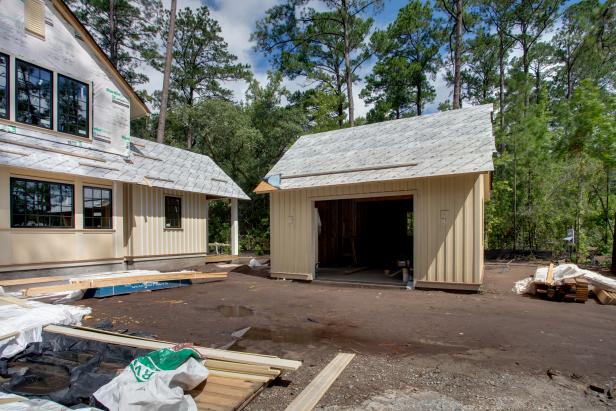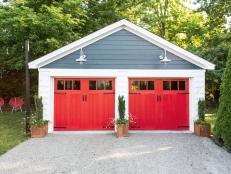Cost Per Square Foot to Build a Garage
There are a number of things that must be considered when trying to calculate how much it costs to build a new garage. With so many factors that determine the cost per square foot of any building, it’s not possible to give any standard price prediction. Here are some of the biggest factors affecting the construction cost of your new garage project.

David Robinson

What Kind of Garage Are You Building?
The most important question to ask before anyone can give you a cost estimate is, what are you trying to build? A two-car attached garage with no windows and a minimum of electrical improvements will likely be far cheaper than the same two-car detached garage with windows, insulation, a 60-amp electrical service, plumbing and finished drywall. It’s important to know not only your desired square footage but how complete you want your finished structure to be. A fully finished and insulated garage will definitely cost more than an unfinished one but might pay dividends in the long run. Knowing exactly what type of garage you're looking for will make the process of requesting bids from contractors much easier.
Do You Need to Pour a Driveway?
Whether you're connecting an existing driveway or pouring a completely new one, you’ll want to factor that into your estimate. Concrete driveways are typically more expensive than asphalt drives, and that decision will factor heavily into your price as well. If you live someplace where a gravel drive is acceptable, or if you can build your garage door out toward an alleyway, you could shave a lot off the cost of your project.
Don’t Forget About the Foundation
Every garage project is going to require a foundation of some sort. The size of your garage, its location and your local building codes will dictate what options are available to you. If you’re just building a small detached garage, you might be able to get away with a simple gravel pad, but more than likely, you’re going to need to pour a concrete foundation. With a concrete foundation you have many options, but odds are good that your site will require a specific solution. It’s quite possible to spend anywhere from $6,000 to $10,000 for a basic 30’ x 30’ foundation.
Utilities Will Add More
If your garage is attached to the house and there’s enough extra capacity in your breaker box, it’s possible to simply piggy-back your garage’s plumbing and electrical systems to that of your home. If you’re planning a detached garage, things can get more complicated. You’ll need to run a trench out to your project site so that you can run power and water to your shed if needed. More than likely this will require permits and approval from your local building inspector, along with a licensed electrician to perform the work.
Where You Live Has an Impact on Cost
If you live in parts of the country that are susceptible to earthquakes, heavy snow loads, flooding or frequent high winds, you’ll likely be required to build your garage to specific safety codes. Additionally, some communities have specific ordinances or historic design review boards that will dictate how your garage must look or fit into its surroundings. Those requirements often must be satisfied with drawings before any building can begin. All of these things will affect the design of your garage and have a direct impact on its cost.
It’s also possible that you might live someplace rural that is essentially free of restrictions and doesn’t have the same code enforcement that a suburban construction project has. This can potentially lower the overall construction cost of your garage and really give you the freedom to build whatever you like. It’s still a great idea to consult a contractor if you’re planning on doing most of the work yourself to avoid any pitfalls.
No matter where you live, it’s important to check with your city and/or county code enforcement office. They'll help you understand what permits and inspections you’ll need in order for your structure to be completely safe and legal.
The Economy Has an Impact, Too
Construction costs fluctuate almost as wildly as the stock market does. If fuel prices increase or if construction materials become more scarce, this will have a direct impact on the cost of your project. Additionally, when the construction market is strong, many contractors find themselves busy with larger, high-dollar projects and may not show interest in a small job like a garage.
The general rule of thumb with any home addition is that they almost never get cheaper the longer you wait. As resources become more expensive and construction wages go up, your project’s price will go up as well. There’s no time like the present to get your new garage project underway.













































